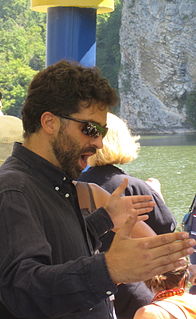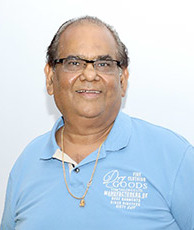A Quote by Meera Menon
My dad is an engineer by trade but worked a lot with the people in the Indian film industry when I was growing up. He started out distributing films from India here in the '70s because there was no place to go for people to watch movies from the homeland. So he developed a network of actors, writers, directors, and musicians that became his friends and that he would tour around the country with, doing stage shows of the musical numbers from their films.
Quote Topics
Actors
Around
Became
Because
Country
Dad
Developed
Directors
Doing
Engineer
Film
Film Industry
Films
Friends
Go
Growing
Growing Up
His
Homeland
India
Indian
Industry
Lot
Movies
Musical
Musicians
My Dad
Network
Numbers
Out
People
Place
Shows
Stage
Started
Tour
Trade
Up
Watch
Watch Movie
Worked
Would
Writers
Related Quotes
I started doing documentaries in the first place because of the war. I always wanted to do feature films, and I studied directing when the war started, so I was working with actors before, in film and in theater. So I think it's easy to work with actors when you have a script that is clear, when they know what and why they are doing it.
Filmmakers need to give the audience that something extra, an incentive to spend money and go to the multiplex - the ticket prices are high. Otherwise they'd just stay home, buy DVDs or download movies. But if there were only big budget movies it would be impossible for the film industry to survive. So I emphasize the importance of mid-range films. But those films need the support of theatre owners. The theatre chains have to have the vision to realize the need to support smaller films for the growth of the domestic film industry.
From the moment I met Martin Scorsese in 1962, he educated me about the films that had taught him so much about filmmaking. He had been deeply affected, even as a child, by great films that stretched his mind and struck into his heart, and he was eager to share them with friends and people who worked with him or with actors who were in his films.
Most Chinese filmmakers grew up watching television; they watched films on television, not in cinemas. The scope of their vision is not big enough, they're not yet detail-oriented enough. You have to watch films in cinemas for years to understand the depth and scope of vision needed in filmmaking. Directors in China usually come from an academic background; they graduate as film directors. Whereas the directors from Hong Kong learn their trade on sets, beginning at the lowest rung.
When I first started out, it was very, very difficult to even get in the room with directors or casting directors because they would see that I hadn't been to drama school and wouldn't want to see me. Now, I feel like it's changing. We have this new generation of a lot of writers, directors and actors who are just breaking through, and they're doing it for the passion.
When you go and you tour Europe, or you go and you tour Egypt, or you go and you tour Iraq, or you go and you tour Afghanistan, or India, or whatever. Governments get to a point where they're illegitimate because people just give up on them as far as being leaders who have their country's interests at heart.
My experiences growing up - my father lived in New York, so I was going out there in the summers and meeting really interesting people and people having what seemed to me to be extraordinary experiences and really taking advantage of these wonderful opportunities. And so I will go - I would go to the big city and watch these people performing onstage and doing television and films. And then I would go back to Hayward, and it just suddenly felt that much smaller and sort of limiting because I had this hyper awareness of how much larger the world was.
































